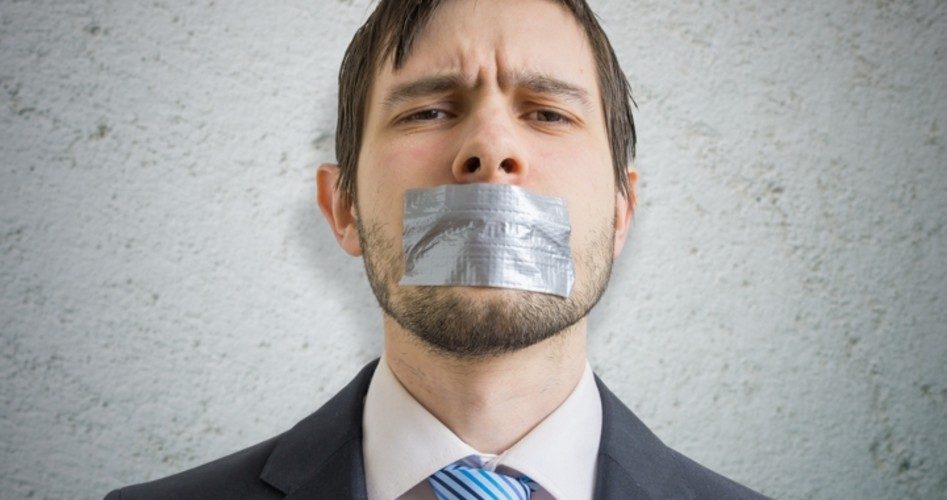
George Orwell may have had policies like those at the University of Michigan in mind when he wrote of “Thought Police” in his dystopian novel 1984. The university’s “bias response teams” have been busy reporting on speech considered “hateful” or “hurtful” and threatening academic careers on the altar of Political Correctness. But now, UM will have to defend its anti-First-Amendment policies in court.
The organization Speech First has filed for an injunction against UM President Mark Schlissel, declaring that he and the university have “created an elaborate investigatory and disciplinary apparatus to suppress and punish speech other students deem ‘demeaning,’ ‘bothersome,’ or ‘hurtful.’”
From the complaint: “The University’s disciplinary code prohibits ‘harassment’ and ‘bullying’ and further increases the potential penalties if such actions were motivated by ‘bias.’ All of those concepts, as the University interprets and applies them, can capture staggering amounts of protected speech and expression.”
In 2016, after the election of Donald Trump, Schlissel told a gathering of upset students who voted for Hillary that they had rejected hate. “Ninety percent of you rejected the kind of hate and fractiousness and the longing for some sort of idealized version of a non-existent yesterday,” Schlissel told the group. By implying that 10 percent voted for “hate and fractiousness,” isn’t Schlissel being “hateful” and “hurtful” to a minority group?
Founded by free-speech advocate Nicole Neily, Speech First is an organization concerned with not only responding to violations of the First Amendment on campuses, but aggressively fighting policies that encourage those violations. The organization looks to smash the speech-code culture that has developed on America’s college campuses. And the organization has their work cut out for them.
The Foundation for Individual Rights in Education (FIRE) is a free-speech watchdog group that documents the many violations of the First Amendment on college campuses. The group uses a stoplight rating system, with “green” meaning that there is no serious suppression of free speech, “yellow” meaning that the institution bears watching, and “red” meaning that free speech is in definite jeopardy on a campus. In 2018, 32.3 percent of public universities received a “red” rating from FIRE. The University of Michigan is rated “red.”
“They (Michigan) have a red speech code, unfortunately,” Neily told NRA TV recently. “It discourages bullying and harassment but it doesn’t define what that is, so it ends up being very much in the eye of the beholder. And, unfortunately, you end up catching a lot of protected, First Amendment speech then and that’s no good. That’s when we have to spring into action and protect our members’ rights,” she continued.
One bothersome thing about free-speech codes, such as the one at UM, is the nebulous language in them. They restrict speech if it is “demeaning” or “bothersome,” and this gives the administrations and “bias response teams” wide latitude to restrict speech since no one defines the terms. “The problem is, nobody knows what they can be in trouble for,” Neily pointed out.
Because political speech can often be controversial, and certainly may be considered “bothersome” by those who disagree with it, the students involved in the lawsuit are rightly concerned that their freedom of expression on campus may be jeopardized by having politically “incorrect” views on the Second Amendment, abortion, traditional marriage, or identity politics.
“We say that there is a chilling atmosphere on campus,” Neily said. “Because they don’t know [what speech is offensive], they’re scared, they’re just discouraged from speaking at all…. In our minds, that’s not a real educational experience.”
Students can anonymously report incidents of offensive speech to the University, which forwards these reports to the Bias Response Team, which is made up of administrators and some campus police. The campus inquisition team can then call the so-called offender in for an investigation. If it finds validity (real or imagined) in the reported claim, they can order the offending student to go through “restorative justice,” which can include being sent to cultural appropriation training, diversity training, or unconscious bias training.
So, college students are being taught to “inform” on classmates over their use of language, just as the Soviet KGB encouraged the youth of the Komsomol to inform on family members who strayed from the party line. Like in the days of Stalin, these offenders against orthodoxy can be sent for “reeducation.” So far, no American gulags are yet in operation. Hopefully, it stays that way.
FIRE reports that 231 universities have various incarnations of these bias response teams.
Image: vchal via iStock / Getty Images Plus




